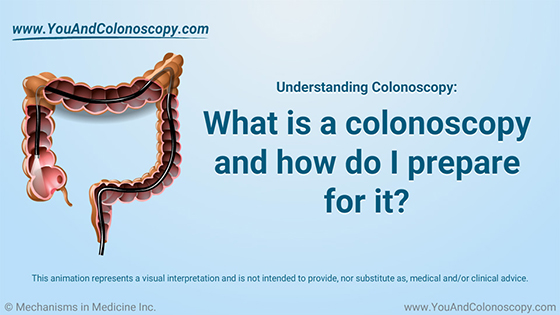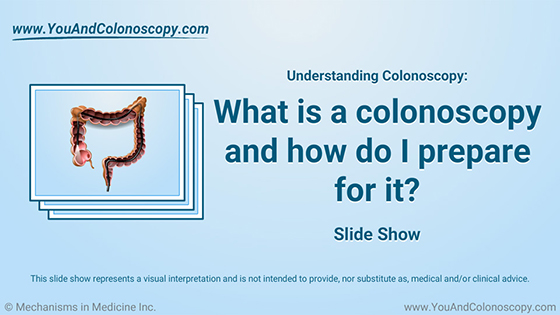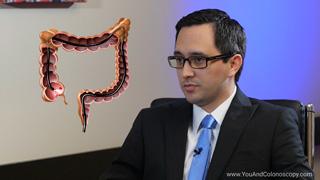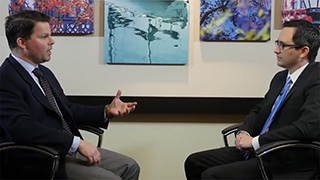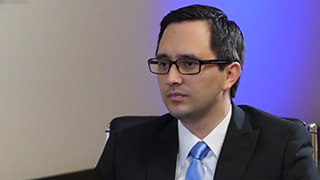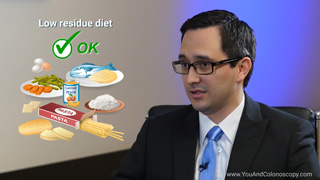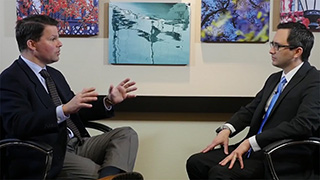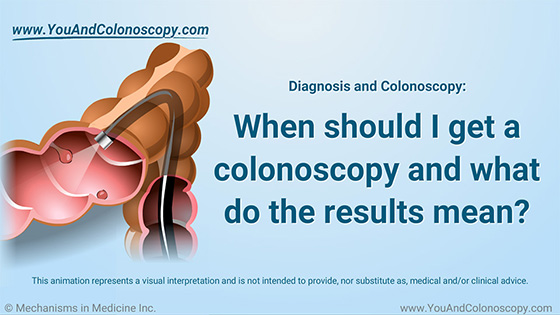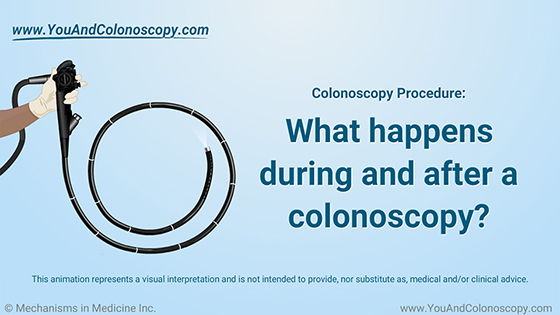*Please note: This slide show represents a visual interpretation and is not intended to provide, nor substitute as, medical and/or clinical advice.
The large bowel is the final part of the body’s digestive system ...
... and is made up of the cecum, colon, rectum and anus.
The colon can be described in four areas: the ascending colon, the transverse colon, the descending colon and the sigmoid colon.
The purpose of the colon is to help absorb water and remaining nutrients from digested food. The waste material that remains in the colon is then formed into stool and stored until a bowel movement.
Over time, the tissue of the colon may develop small growths, called “polyps”. These polyps may be normal (also called “benign”), but sometimes they can turn into colon cancers.
Many patients can benefit from colon cancer screening. Depending on your age and your circumstances, your doctor may recommend a colonoscopy to examine the health of your colon, as well as to screen for colon cancer and remove polyps.
A colonoscopy is a medical procedure that lets your doctor look inside your colon and rectum …
… for problems such as ulcers, inflammation, bleeding, polyps and tumors.
Before your colonoscopy, your bowel must be completely cleansed. This cleansing process is called bowel preparation (or “bowel prep”) and it is a key step to having a successful colonoscopy.
If your bowel prep is not done properly, your doctor will not be able to clearly see inside your colon.
As a result, polyps or other abnormalities may be missed and your colonoscopy may take longer than normal, or you may need to do your colonoscopy again at another time.
The better the quality of your bowel prep, the higher the chance that your doctor can find polyps.
By finding polyps early, there is a better chance of preventing colon cancer.
The bowel prep process includes dietary restrictions and taking a bowel prep medication.
Before your colonoscopy procedure, your doctor will give you the exact diet and bowel prep instructions that you need to follow. Make sure you fully read the instructions ahead of time and that you plan accordingly.
Some medications may need to be adjusted prior to your colonoscopy, such as insulin, or heart medications, or blood thinners.
For most patients about to have a screening colonoscopy, blood thinning medications need to be stopped for a few days prior to the procedure. Be sure to discuss the use of these medications with your doctor.
Three days before your colonoscopy, you will need to begin a low residue diet of foods that are very low in fiber and easy to digest.
Examples of low residue foods you can eat are: white bread, rice and pasta, plain crackers, canned fruit and cooked vegetables without skin or seeds, lean meat, chicken or fish without skin, eggs, and limited amounts of dairy.
Do not eat whole-grains, nuts, seeds, fatty foods, tough meat, raw or dried fruit, raw or partially cooked vegetables, and no corn, broccoli, peas or beans.
The day before and the day of your colonoscopy you will need to limit your diet to clear liquids only.
Examples of clear liquids your doctor may recommend include: clear broth, black tea or coffee, clear, light-colored juices, clear soft-drinks, clear sports drinks, plain gelatine without fruit, pulp-free juice bars, and water.
Do not drink alcohol, liquids you can not see through, or dairy products, or red or purple liquids (as these colors may linger in the colon and make the examination more difficult).
On the day of your colonoscopy, you must not drink anything two hours before your procedure.
Bowel preps are prescription and over-the-counter medications that cause diarrhea for several hours, and thus, empty your colon.
They require you to drink large volumes of clear liquids and that you stay well hydrated during the process.
You will need to stay near a bathroom for a few hours until the effects of the bowel prep medication have worn off.
Your doctor will prescribe the bowel prep medication that is right for you based on your medical history, physical health and personal needs.
There are different types of bowel prep medications available and your doctor will give you exact instructions to follow.
Some bowel prep medications work by flooding liquid through your colon to flush out stool.
Other bowel prep medications work by pulling large amounts of water into your colon to flush out stool.
No matter which bowel prep medication you are prescribed, the recommended way to take it is called “split dose”.
This means you will need to drink half your bowel prep medication the night before your colonoscopy, and drink the other half 4 to 6 hours before your procedure.
The amount of time between your last dose of bowel prep medication and your colonoscopy depends on what time your procedure starts. The correct timing is very important because it ensures that you have the cleanest colon possible for your colonoscopy.
After finishing your second bowel prep dose you MUST NOT drink anything for at least 2 hours before your colonoscopy. On occasion, you will be asked not to drink for a longer period of time. Please follow the instructions from your doctor.
Bowel prep medications should be used with caution in patients with heart failure, kidney failure, end-stage liver disease, or other medical conditions.
Be sure to talk to your doctor if you have any of these conditions.
Preparing for a colonoscopy may feel scary or uncomfortable, but it is very important to do it right.
Remember: A complete bowel prep is the key to a good colonoscopy.
Colonoscopy is the easiest and best way to prevent and detect colon cancer. Take action and talk to your doctor about your bowel health.
